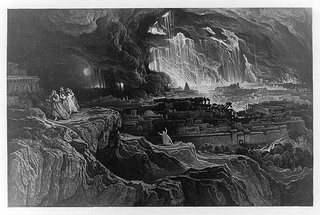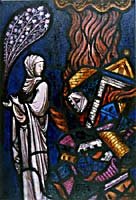 OK, Connor, we'll eventually get to the Vice Lists, but in deference to our anonymous commenter, let's start with the account of Sodom and Gomorrah in Genesis 19.
OK, Connor, we'll eventually get to the Vice Lists, but in deference to our anonymous commenter, let's start with the account of Sodom and Gomorrah in Genesis 19. Most of us know this story: two angels come to visit Lot in Sodom, and Lot invites them to stay with him in his house. The angels agree. While they are there, the men of the city come to Lot's door and demand that he send out his guests so that they can rape them. Lot tries to send out his two daughters to protect his guests, but the men scoff at him and demand the visitors. The angels pull lot back into the house, close the door, and blind everyone in the crowd. Then they warn Lot to hightail it out of Sodom, because they're going to nuke it.
Lots of people seem to think this story is a condemnation of homosexuality. In many of our churches, we have interpreted God's later destruction of Sodom and Gomorrah as a dramatic judgment on this behavior, and the modern word "sodomy" even implies that the characteristic sin of Sodom was aberrant sexual behavior. But if you read the story slowly, and with an eye to ancient custom, it becomes painfully obvious that the story is not about homosexuality. It's about hospitality. About what you do with the strangers who are among you.
Go ahead, read the story if you haven't read it lately.
As you read the story, I hope it became immediately obvious what the theme is. If it wasn't obvious, let's rehash: Lot meets strangers at the gate of the city and is the very model of hospitable behavior.
The two angels arrived at Sodom in the evening, and Lot was sitting in the gateway of the city. When he saw them, he got up to meet them and bowed down with his face to the ground. "My lords," he said, "please turn aside to your servant's house. You can wash your feet and spend the night and then go on your way early in the morning."
"No," they answered, "we will spend the night in the square."
But he insisted so strongly that they did go with him and entered his house. He prepared a meal for them, baking bread without yeast, and they ate.
Then, in contrast with Lot, the men of Sodom show up to abuse the guests. In particular, they're going to insult their manhood by raping them. Lot tries to protect his guests.
Lot went outside to meet them and shut the door behind him and said, "No, my friends. Don't do this wicked thing. Look, I have two daughters who have never slept with a man. Let me bring them out to you, and you can do what you like with them. But don't do anything to these men, for they have come under the protection of my roof."
Notice that Lot's need to protect the strangers comes even before the protection of his own family. But those lustful men of Sodom respond as expected:
"Get out of our way!" they replied. "We are overcome with homoxsexual lust, like vampires who need to feed! We know that it is wicked, but we must have homosexual sex!"
Oh, wait, that's not right.
"Get out of our way," they replied. And they said, "This fellow came here as an alien, and now he wants to play the judge! We'll treat you worse than them." They kept bringing pressure on Lot and moved forward to break down the door.
Again, more abuse for the stranger and alien, and this time the alien is Lot. But those wiley angels pull him back into the house and blind the attackers. Then they hustle Lot out of Sodom and set it ablaze. The end.
Now if you didn't go back and read the story earlier, please go back and read the whole thing. You won't realize how much the story focuses on hospitality until you read it. Victor Paul Furnish summarizes it well in an article I read recently:
This is not a story about homosexual behavior in general -- and certainly not a story about homosexual acts performed by consenting adults. It is a story about the intent to do violence to strangers, who ought rather to have been accorded protection. It is only incidental to the story that, had the attack succeeded, it would have meant the rape of Lot's two male visitors by a mob of other males.
Victor Paul Furnish, "The Bible and Homosexuality: Reading the Texts in Context", in John Carey, ed, The Homosexuality Debate in North American Churches..
In other words, if the angels had ... um ... manifested themselves as females, and the story would read exactly the same. If we're going to read into this story a condemnation on homosexual sex, we might as well say that the story of Rahab the harlot shows God's approval of prostitution. So say it with me now...
"The Sodom and Gomorrah story has NOTHING to say about the morality of consensual homosexual sex."
And if you're still not convinced, let's look to A.Lo's recent comment, which echoes another bit of the Furnish article. Furnish gives a brief mention to a passage in Ezekiel 16, which quotes God as saying the following:
Now this was the sin of your sister Sodom: She and her daughters were arrogant, overfed and unconcerned; they did not help the poor and needy. They were haughty and did detestable things before me. Therefore I did away with them as you have seen.
I'm a little bit reluctant to accept A.Lo's argument ... as a rule, I try not to take a scripture from one book and make it apply to a story from another book, even if the passages seem to be talking about similar things. In this passage, Ezekiel isn't really concerned about completing a rap sheet for Sodom; instead, he's making a comparison between Sodom and Israel. But Ezekiel's focus on the poor and needy may be helpful if we take it as an antidote to what our culture has taught us about the Sodom story -- that it's about homosexuality.
 In the Hebrew Scriptures, "the stranger and alien among you" are often lumped into a category with the poor and needy. So when Ezekiel makes reference to the poor and needy, we may infer that he interprets the Sodom story as a story about the men of Sodom abusing this category of people. And across the entire Bible, protecting the stranger is a much bigger theme than the wickedness of homoerotic behavior. The hebrew prophets are constantly saying things like, "God wants you to love those who are outsiders, and protect those who are defenseless."
In the Hebrew Scriptures, "the stranger and alien among you" are often lumped into a category with the poor and needy. So when Ezekiel makes reference to the poor and needy, we may infer that he interprets the Sodom story as a story about the men of Sodom abusing this category of people. And across the entire Bible, protecting the stranger is a much bigger theme than the wickedness of homoerotic behavior. The hebrew prophets are constantly saying things like, "God wants you to love those who are outsiders, and protect those who are defenseless." So maybe the lesson that today's church needs to learn from the Sodom story is not, "God will rain fire on you if you're gay", but "God will rain fire on you if you don't stand up for those people among you who are strangers, those who are different, those who are, perhaps, a bit queer."
8 comments:
Too air-tight; if you want comments you got to leave something to debate.
I agree with Connor. The Sodom and Gomorrah story is almost a slam-dunk, as far as taking passages out of context goes. (Although plenty of people, I know, still interpret it as referring to homosexuality.) I think Leviticus is far more challenging.
This is a great resource-- thank you.
HAHAHAHAHA! "Get out of our way!" they replied. "We are overcome with homoxsexual lust, like vampires who need to feed! We know that it is wicked, but we must have homosexual sex!"
I think I weed my trousers a bit. Thanks for the biting sarcasm on a day when I really, really needed to see something like that.
That comment makes me happy. =)
Jude 7 In a similar way, Sodom and Gomorrah and the surrounding towns gave themselves up to sexual immorality and perversion. They serve as an example of those who suffer the punishment of eternal fire.
You're backposting again...
I think we all agree that S&G gave themselves up to sexual perversion, I just think we disagree on whether the "perversion" was the homosexual part, or the rapine part.
Post a Comment